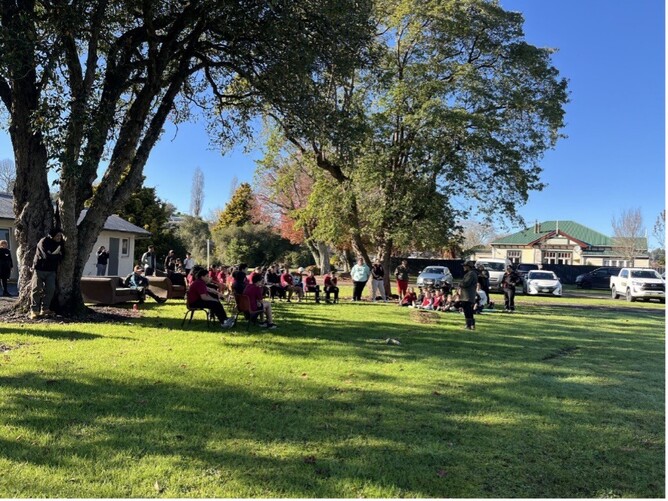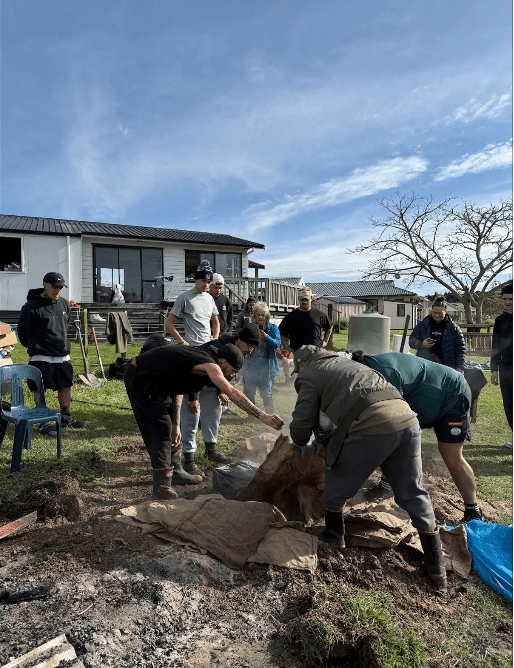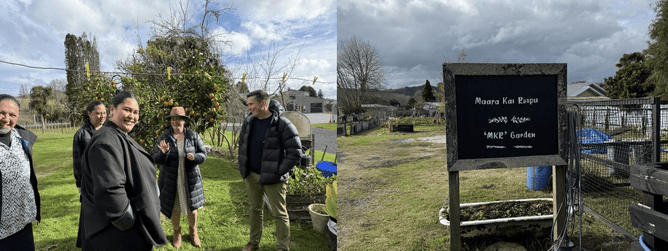June was a powerful month for kai-focused kaupapa across the Waikato region and beyond. As part of Matariki ki Waikato, WWP and Go Eco partnered with Te Ohu Whakaita to host four engaging kai wānanga, each aligned with a different star of the Matariki cluster and the unique food systems they represent. These wānanga celebrated mātauranga Māori, stories of kai, and the importance of community connection.
The series launched with an opening ceremony where our Waikato Kai Challenge Project Lead, Hera Denton addressed a room of community leaders, Kiingitanga representatives, and local government officials. Hera’s presentation drew on data from the Waikato Foodshed Report and Want Amongst Plenty, illustrating the scale of food insecurity in our region. The kōrero resonated widely and has led to further invitations to present and share insights across a range of spaces.
Waitī – Freshwater: Held in Te Kūiti, this wānanga explored freshwater systems and the kai sourced from within these systems. We walked the whenua, learned about the signs the river shows us, and discussed the importance of restoring waterways for the health of our people and our kai systems.
Waitā – Saltwater / Moana: Delivered in Whaingaroa, this wānanga focused on the ocean and gathering kai moana. Despite the weather keeping us off the waka, the kōrero was deep and meaningful. Participants shared their experiences, asked thoughtful questions, and expressed a strong desire to return for future kai gathering activities. The safe and inclusive space enabled open discussions about tikanga, intergenerational knowledge, and our changing relationship with the moana.
Tupuārangi – Kai from the above: Held at the Pukete Neighbourhood House, this wānanga delved into forest ecosystems and the kai that comes from the ngahere. We examined the potential of ngahere-based food systems, including fruit trees and forest gardens. The day blended traditional knowledge with modern practices of caring for trees for kai.
Tupuānuku – Ground-based kai and māra kai: This practical wānanga took place at Kaahui Tuuwa in Rāhui Pōkeka. We learnt about Te Paki o Matariki, the Kiingitanga coat of arms that features seven stars of Matariki. Participants got hands-on in the garden, learning about kumara tipu growing and seasonal planting. It was an inspiring day that reminded us of the potential of whānau and community when we work together to produce kai.
These wānanga were rich in kōrero, learning and connection – a beautiful reflection of the themes of Matariki.
ThinkPlace- Lived Experience Research
Elsewhere in the region, our lived experience research in partnership with ThinkPlace continues. The team travelled to Te Kūiti and spent two days engaging with the Ngāti Maniapoto Marae PACT Trust and the Maniapoto Maara Roopu. Peter and Kataraina from ThinkPlace were welcomed with immense manaaki and generosity and were deeply moved by the willingness of whānau to share their stories. The visit included time spent with trustees, maara workers, and whānau who have long histories of growing kai on their whenua — with fruit trees and other evidence of this still standing strong today. The kōrero covered the past, present, and future of kai in Maniapoto, offering valuable insights into what food resilience looks like in this rohe. These stories will help shape a richer understanding of the lived experience of food in our region and will inform a report currently in development by the ThinkPlace team.
National Kai Hui
Also in June, Hera and Jo (CE – Go Eco) travelled to Te Whanganui-a-Tara to attend Te Whiringa, a national hui hosted by Kore Hiakai. The hui brought together changemakers across Aotearoa to explore systems change, food justice, and collective responsibility. Highlights included deep-dive wānanga into systems change, relationship building, and a Kai & Kōrero evening featuring speakers such as Angela Clifford (Eat NZ), rangatahi from Porirua Citizens’ Assembly, and Helen Robinson (Kai Rawa Trust Chair and Auckland City Missioner). As part of this kaupapa, Go Eco proudly became a formal member of the Kore Hiakai Zero Hunger Collective.
Alongside these events, ongoing conversations, collaborations, and relationship building continue across the Waikato region. We are deepening connections with local iwi, whānau, marae, and community organisations working to strengthen food resilience. At the same time, we’re committed to representing the unique experiences and aspirations of our region in national spaces. Our approach continues to weave together research, lived experience, mātauranga Māori, and regional data – ensuring that the voices of our communities are heard, valued, and acted upon in the movement for food sovereignty.




